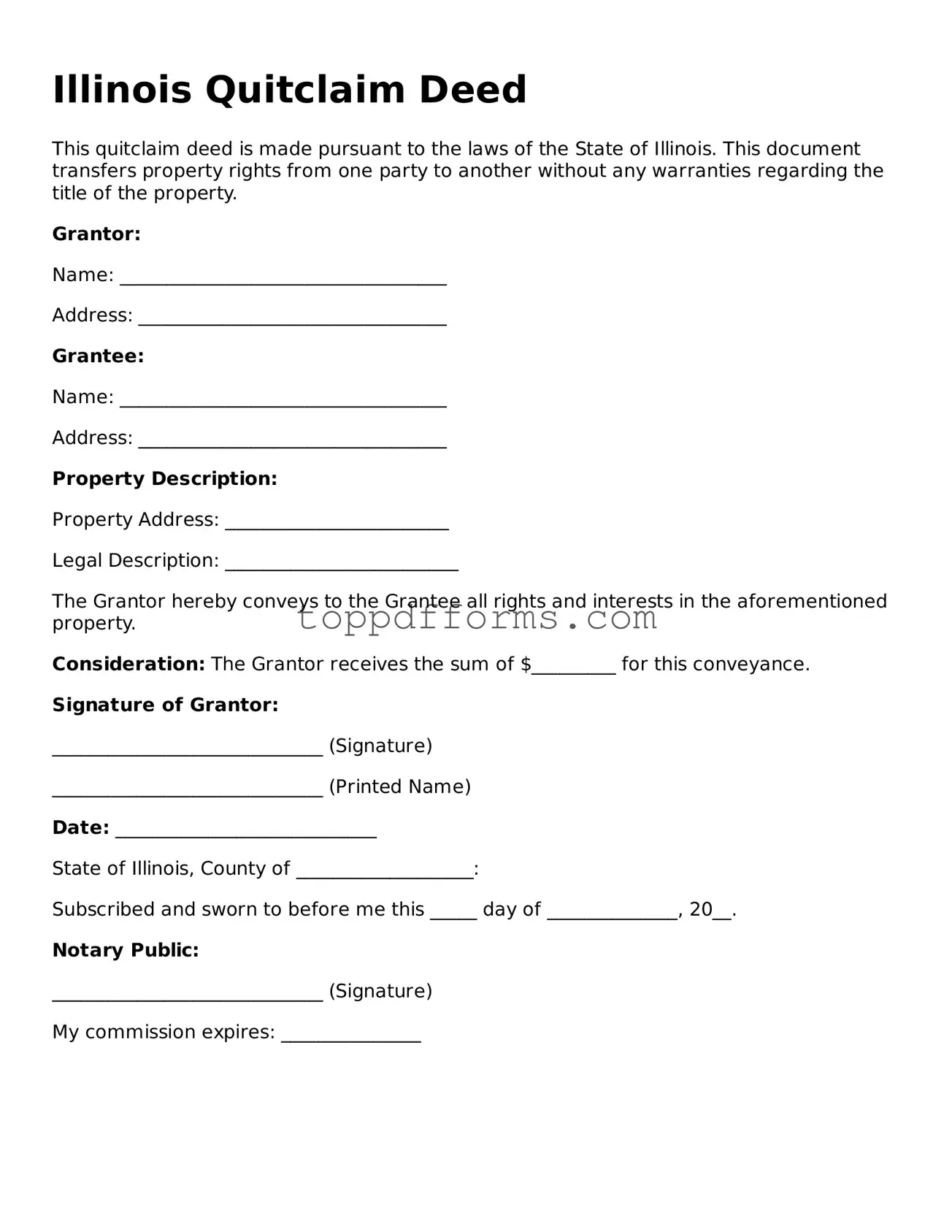Quitclaim Deed Document for Illinois State
Things You Should Know About This Form
What is a Quitclaim Deed in Illinois?
A Quitclaim Deed is a legal document used to transfer ownership of real estate from one person to another without making any guarantees about the property title. In Illinois, this type of deed is often used among family members or in situations where the parties know each other well. It allows the grantor to relinquish any interest they may have in the property, but it does not provide any warranty regarding the title's validity or any existing liens or encumbrances.
How do I complete an Illinois Quitclaim Deed?
To complete a Quitclaim Deed in Illinois, you need to provide specific information. This includes the names of the grantor (the person transferring the property) and the grantee (the person receiving the property), a legal description of the property, and the date of transfer. Both parties must sign the document in front of a notary public. It’s also important to check local regulations, as some counties may have additional requirements.
Do I need to record the Quitclaim Deed?
Yes, it is advisable to record the Quitclaim Deed with the county recorder's office where the property is located. Recording the deed provides public notice of the transfer and protects the grantee's ownership rights. While recording is not legally required, failing to do so may lead to complications in proving ownership in the future.
Are there any fees associated with filing a Quitclaim Deed in Illinois?
Yes, there are typically fees for recording a Quitclaim Deed in Illinois. These fees vary by county, so it is important to check with the local recorder's office for the exact amount. Additionally, there may be other costs associated with preparing the deed, such as notary fees. Be sure to budget for these expenses when planning the transfer of property.
PDF Overview
| Fact Name | Details |
|---|---|
| Definition | A quitclaim deed is a legal document used to transfer ownership of real estate without any warranties. |
| Governing Law | The Illinois Quitclaim Deed is governed by the Illinois Compiled Statutes, specifically 765 ILCS 1005. |
| Use Cases | Commonly used among family members, in divorce settlements, or to clear up title issues. |
| No Guarantees | This deed does not guarantee that the grantor holds clear title to the property. |
| Filing Requirements | To be valid, the deed must be signed by the grantor and notarized before being recorded. |
| Transfer Tax | Illinois may impose a transfer tax on real estate transactions, including those using a quitclaim deed. |
| Property Description | A legal description of the property must be included in the deed for it to be valid. |
| Limitations | Quitclaim deeds are not suitable for transactions where title insurance is required. |
| Record Keeping | It is important to record the quitclaim deed with the local county recorder’s office for public notice. |
| Revocation | A quitclaim deed cannot be revoked once it has been executed and recorded. |
Common mistakes
Completing an Illinois Quitclaim Deed form can be a straightforward process, but mistakes can lead to complications. One common error is failing to include all necessary parties. When transferring property, it is essential to list both the grantor (the person transferring the property) and the grantee (the person receiving the property) accurately. Omitting a party or misspelling their name can create legal challenges later on.
Another frequent mistake involves not properly describing the property being transferred. The deed must include a clear and precise legal description of the property. This description should match what is recorded in public records. If the description is vague or incorrect, it can result in disputes over property boundaries or ownership.
People often overlook the requirement for notarization. In Illinois, a Quitclaim Deed must be signed in the presence of a notary public. Failing to have the document notarized can render it invalid. This step is crucial for ensuring that the deed is legally binding and can be enforced in court if necessary.
Finally, many individuals neglect to record the Quitclaim Deed with the appropriate county office after it has been completed. Recording the deed is vital for public notice of the property transfer. Without this step, the new owner may face challenges in proving ownership or may encounter issues when trying to sell or finance the property in the future.
Other Common State-specific Quitclaim Deed Forms
Quitclaim Deed Ohio - A Quitclaim Deed transfers ownership without warranties.
When engaging in a trailer transaction, it's crucial to have a properly documented record of the sale. The Trailer Bill of Sale not only serves this purpose but also ensures that all parties are in agreement regarding the details of the transaction. To streamline the process, you can find the necessary forms and resources by visiting PDF Templates, which can guide you through completing your documentation accurately.
Quit Claim Deed Form Ny - A Quitclaim Deed can facilitate a property donation to a nonprofit.
